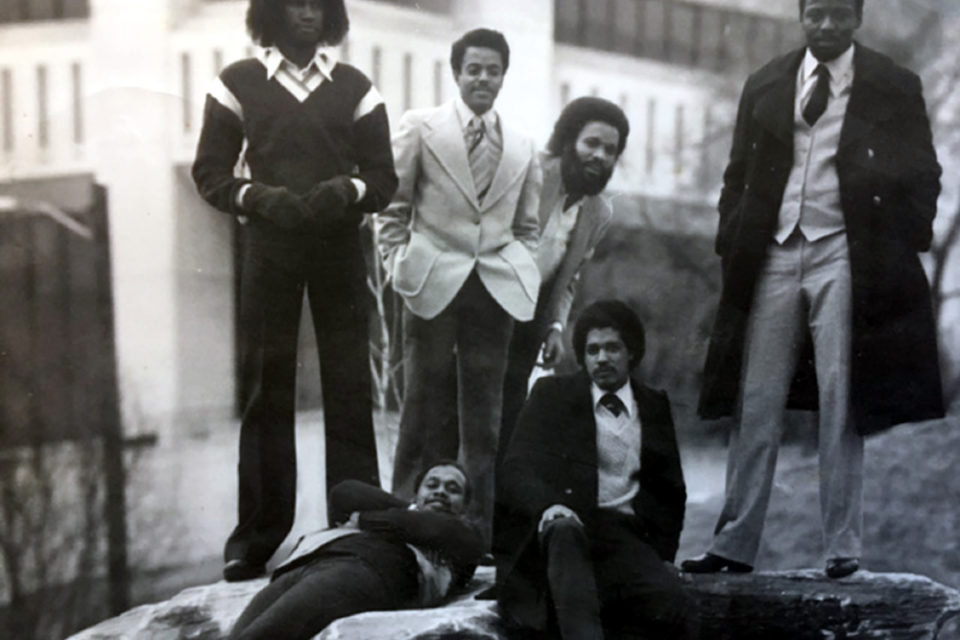The steady, radar-like beeping of vital sign monitors has long been the daily soundtrack for a doctor in training. Back in 1979, a handful of students at Meharry Medical College, a historically Black, Nashville institution, were equally enthralled with the bright, sumptuous fusions of jazz, pop, rock and funk they heard from the likes of Quincy Jones, Chick Corea, Yellowjackets, Parliament and Earth, Wind & Fire.
“My classmates and I would often go to each other’s place and sit and listen to music and pretend we were playing the music and just having fun,” recalls Clifford Becker, a founding member of the IgG Band. “We noticed that Kendal [Foster] knew how to play guitar. Murray [Riggins] knew how to play bass. I was fiddling around the flute, teaching myself. And so it was just kind of like, ‘Well, why don’t we do some band stuff and get more people in on this.’”
“Of course, studying was hard,” Becker adds, “but if you study efficiently, you have some time to do things. And we decided that’s what we’d do in our free time.”
Some of the guys, including Foster, had years of formal musical training to draw on; he’d been accepted into Interlochen Arts Academy, a prestigious boarding program, at age 11, and focused on music up through his undergrad years, until he turned to medicine.
He and his comrades, who also included Solomon Pollard and Kermit White, weren’t interested in simply being a cover band. For them, working up originals with jazz chords, syncopated grooves and exuberant vamps was an escape from the subject matter that they were required to master.
“I think that’s all part of how we dealt with some of the stresses of the rigors of medical education, was getting together and jamming,” Foster summarizes. “We wanted to do something fairly sophisticated. We knew we had enough musical knowledge to put it together.”
Saturday mornings proved to be the best time for them to convene, since no one had classes or clinicals. The student musicians got permission to practice in an auditorium at Meharry, and most of their performances were for on-campus crowds at talent shows and festivals. Once, they were tapped to play Muhammad Ali onstage at a school event.
No one grasped the band name they’d settled on more thoroughly than their medically knowledgeable classmates, says Becker. “IgG is a name of one of your body’s antibodies that help fight off diseases,” he explains. “There’s, like, five different ones. And we chose that one because it was simple. It’s kind of easy to remember.”
Looking back, Foster sees their moniker as proof of how forward-thinking they were: “Immunology was just kind of coming in to the forefront in the ‘70s. And I think what we were trying to be was we kind of say, ‘Well, we’re cutting edge.’”
The IgG guys were just as studious about making an album as they were about everything else. They read a book on how to do it, shopped around for reasonable studio rates, dipped into their student loans and refined their arrangements before going in to record. With limited time and money, Foster says they were highly motivated to get things done. The mixing process wasn’t finish by the time he had to leave for Florida with his then-pregnant wife, so that she could spend Christmas with her family. He proposed postponing that step until January, but was outvoted, and returned to find that one of his compositions, “Daydreaming,” had been shortened.
“They cut the last verse; that’s something I have to live with,” he chuckles, making clear that honoring his “grown priorities” ensured that he stayed married.
In 1980, the band pressed 1000 vinyl copies of the album, titled it with another medical reference, Ultra/Sound, and put a drawing of immune system activity portrayed as battling spaceships on the cover. It got a small amount of college radio airplay and record store sales in Nashville, but Becker says their goals were more modest: “Mostly we got sold on campus and to our friends and family. And you know, that was good enough for us. We were not going to trade music for medicine.”
Levelheaded as they were, the IgG Band even turned down the offer of a label deal, one that, Becker recalled, “sounded like one of those standard contracts where the artists are not going to make any money and the record company is going to take all the profits, if they get any.”
The members scattered to different states to complete their residences and begin their careers as doctors. They’d been practicing medicine for a couple of decades when Becker, who still works as an emergency room physician in the Atlanta area, learned that Ultra/Sound had become a collector’s item.
“I had a gentleman call me,” Becker begins with quizzical amusement. “Said he was from Chicago and he was interested in buying any albums I had. I said, ‘What’s this about?’”
The caller, it turned out, was a record collector, looking to snatch up any available copies of Ultra/Sound. “So I think I sold him about five at 50 bucks apiece,” Becker remembers. “I was like, ‘Oh my God. I wish I had about ten more.”
Over the years, he and his former band mates heard of copies selling for hundreds of dollars online. Sometimes, it was their own children letting them know when a vinyl LP popped up with an inflated price tag. Still, it caught everyone off guard when the British archival label Kalita Records reached out to Becker about getting the rights to properly reissue the album, and finally make it available everywhere.
There’s something heartening about now-veteran doctors witnessing the belated appreciation of music they made together four decades ago, in their student days. Some of them have never stopped making music. “I play every day,” Foster emphasizes, speaking on Zoom from his medical office in Mobile, Alabama between patients, his framed degrees visible on the dark, paneled wall behind him. “And my joke is that I practice medicine so I can afford my extremely expensive guitar habit.”
He doesn’t consider it at all unusual that doctors would gravitate toward music: “The whole thing is kind of the Leonardo da Vinci thing of the body is art and the whole functions of the body music. And it’s when you really break it down analytically, music is movement of airways to certain frequencies in a time in a space and time continuum …I see it as all the same.”
Really, it’s just us laypeople who are discovering the medical and musical connection that sparked the IgG Band all of those years ago.
Editor’s note: After this story was completed, we learned of the passing of veteran physician-musician, founding IgG Band bassist and author of the song “Funky Music” Murray Riggins.

